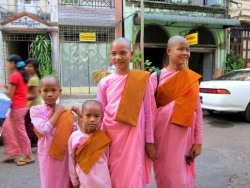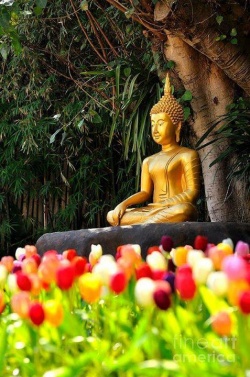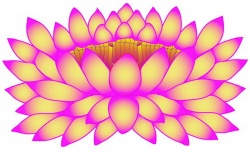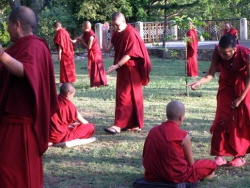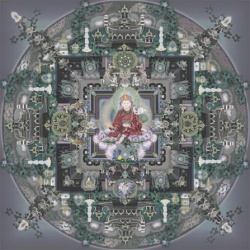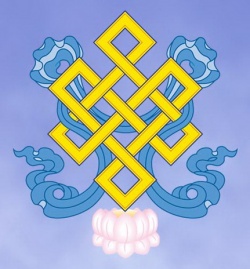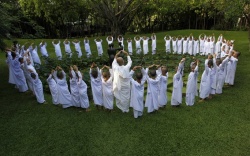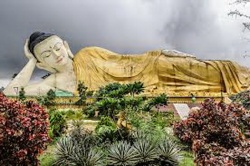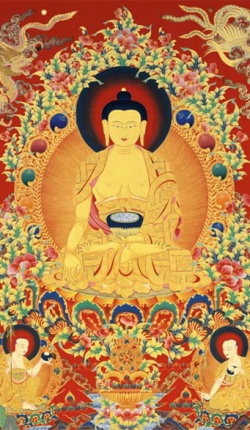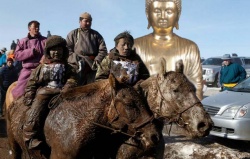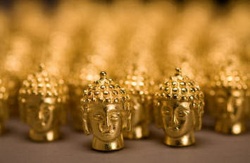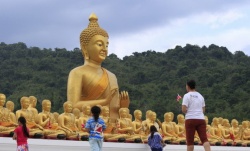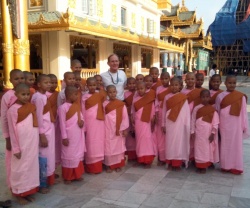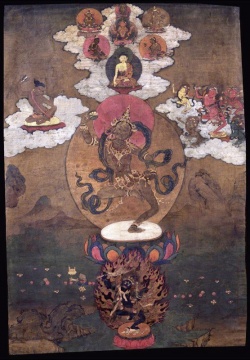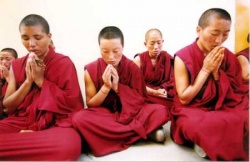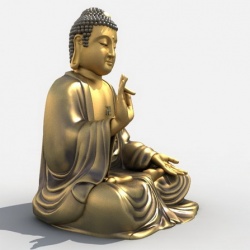Filial Piety in Early Buddhism
By Guang Xing
Abstract
Buddhist scholars like Kenneth Ch'en thought that filial piety was a special feature of Chinese Buddhism. Later, John Strong employed "popular Buddhist stories" to show that filial piety was also important in Indian Buddhism, but he asserted that it was "a Buddhist compromise with the Brahmanical ethics of filiality operating at the popular level." On the other hand, Gregory Schopen, who mainly used Indian Buddhist epigraphical material in his research, pointed out the same idea but he could not find definitive support from the early Buddhist textual sources. My investigation of the early Buddhist texts and analysis of the relevant passages clearly shows that filial piety is one of the important aspects of the early Buddhist ethical teachings. Filial piety was practiced by the early Indian Buddhists (1) as a way of requiting the debt to one's parents; (2) as a chief ethical good action; and (3) as Dharma, the social order. And on this basis it also shows that the early Indian Buddhists practiced filial piety not as a "compromise with the Brahmanical ethics of filiality" but as an important teaching taught by the master.
As Jan Yun-hua points out, early Buddhist scholars such as Kenneth K. S. Ch'en and Ryoshu Michihata thought that "filial piety occupied a special place in Chinese Buddhism." This remained unchanged for some time, until scholars like "Gregory Schopen and John Strong pointed out that filial piety was important to Indian Buddhists as well, and therefore could not be regarded as a unique feature of Chinese Buddhism."(1) In his "Filial Piety and Buddhism: The Indian Antecedents to a 'Chinese' Problem," John Strong employed, to use his own words, "popular Buddhist stories taken from canonical and non-canonical Pali and Sanskrit sources" to show that filial piety was practiced by Indian Buddhist monks as well.(2) But Strong asserted that this practice was "a Buddhist compromise with the Brāhmanical ethics of filiality operating at the popular level towards which the Jatakas were geared."(3) Then he cited the Sama Jataka and the Matuposaka Sutta of the Samyuttanikaya to support his argument. Gregory Schopen, on the other hand, in his article "Filial Piety and the Monks in the Practices of Indian Buddhism: A Question of Sinicization Viewed from the Other Side," mainly used Indian Buddhist epigraphical material, and concluded his research on filial piety in Indian Buddhism by saying that "although [the practice of filial piety] receives no very definite support from 'early' textual sources, it is nevertheless a demonstrable fact."(4) Gregory Schopen further pointed out that this practice was popular among lay people as well as monks, among whom, what is more, it was practiced not only by "the average village monks," but also by the educated monks who appear to have been the teachers and transmitters of official Buddhist scripture. He found three such monks in his epigraphical material: "one is called a Trepidaka, one is called a Dharmakathika, and a third either a Vinayadhara or 'co-resident' of a Vinayadhara, and a Dharmakathika."(5) It seems that Schopen was not aware of John Strong's article, which was published in 1983, a year earlier than his, since he did not refer to, or mention, the latter's research in his paper. However, Schopen's article suggests that filial piety was practiced in India not only by ordinary monks but by the educated monks as well.
Jan Yun-hua, on the issue of filial piety, agrees with Nakamura and says that "Nakamuras position is more realistic, namely, that filial piety was a minor virtue in Buddhist ethics of India, but became a supreme virtue in China."(6) But we think that Jan Yun-huas interpretation of Nakamuras idea is somewhat misleading for the latter just says: "the virtue which corresponding to the idea of filial piety is, of course, taught in the original Buddhist sutras, but only as one of the virtues and not as the supreme virtue."(7) When we read this statement in its context, what Nakamura referred to as "the supreme virtue" is not filial piety in the context of Chinese Buddhism, but in the context of Confucianism. In other words, Chinese Buddhists never consider filial piety as "the supreme virtue" and it was only the Confucian thinkers and scholars who made it the fundamental practice. Here is what Nakamura said before he made the above statement:
Buddhists were forced to teach filial piety to the common people in China just because the most important virtue in Confucianism was filial piety, which demanded a one-sided obedience from children, the younger people, to their parents, the venerated elders. This idea, however, did not exist in Indian Buddhism, as can be seen in the original Sanskrit texts where there is no such term corresponding to the idea of hsiao, filial piety, found frequently in Chinese translations of sutras. The translators must have added this term.( 8 )
Here it is clear that by "the supreme virtue", Nakamura referred to filial piety in the context of Confucianism not that of Chinese Buddhism. In the Chinese translation of the *Madhyamagama, the *Dhanañjani Sutra, which is the counterpart of the Dhanañjani Sutta in the Pali Majjhimanikaya, preaches that all comes under the law of karma. Even if a person does bad deeds for the sake of his parents he will not escape from the consequences of that karma.
Thus, Sariputra said: Tuoran, I will ask you and please answer me (according to your understanding). What do you think, Tuoran? Suppose a person does bad deeds for the sake of his parents, and as a result of the deeds, he is born into hell after the breaking up of his body. After taking birth in hell and when the guards of hell drag him for punishment, suppose he says to the them: guards, please do not punish me because I have done the bad deeds for the sake of my parents. What do you think, Tuoran? Would he be able to free himself from the guards punishment? Answer: no.(9)
Although Chinese Buddhism laid much emphasis on filial piety and even selected the sutras that teach filial piety as a special group for preaching, it still upholds, as Indian Buddhism does, that karma is the supreme principle.
In this paper, with relevant data from the Pali Nikayas and Vinaya and the Chinese translation of Agamas and Vinayas, I propose to show that, first, the textual sources suggest filial piety is indeed one of the important aspects in Buddhist ethical teachings. Scholars who have studied Buddhist ethics, however, have missed it. Second, on the basis of the first point, the early Indian Buddhists practiced filial piety not as "a Buddhist compromise with the Brahmanical ethics of filiality operating at the popular level" as asserted by Strong, but as an important ethics taught by their master himself. Filial piety was not, as Jan Yun-hua interpreted Nakamura, "a minor virtue in Buddhist ethics of India."
In the following discussion, I will mainly use the Pali sources as my evidence with the support of Chinese Agamas in order to avoid the possible accusation that the latter may have been influenced by the Chinese emphasis of filial piety so that the translators may have adjusted their translations as Nakamura pointed out. If the evidence is found in both the Pali Nikayas and the Chinese Agamas and they are identical, then it is quite significant that they most probably came down from a common source before the split of Buddhism into different doctrinal schools.
While teaching, I have collected much material concerning the teaching of filial piety from both the Pali Nikayas and the Chinese Agamas. After a careful analysis, I have categorized these materials into the following three aspects:
(1) Filial piety practiced as a way of requiting the debt to one's parents;
(2) Filial piety practiced as a chief ethical good action, field of merit;
(3) Filial piety practiced as Dharma, the social order.
1. Filial Piety as a Way of Requiting the Debt to One's Parents
In the Kataññu Sutta of the Anguttaranikaya it is said:
Monks, one can never repay two persons, I declare. What two? Mother and father. Even if one should carry about his mother on one shoulder and his father on the other, and so doing should live a hundred years, attain a hundred years; and if he should support them, anointing them with unguents, kneading, bathing and rubbing their limbs, and they meanwhile should even void their excrements upon him - even so could he not repay his parents.
Moreover, monks, if he should establish his parents in supreme authority, in the absolute rule over this mighty earth abounding in the seven treasures - not even this could he repay his parents. What is the cause for that? Monks, parents do much for their children: they bring them up, they nourish them, they introduce them to this world.(10)
According to the *Mahisasaka Vinaya, the parents of Pilindavatsa (Bhikkhu)(11) were poor and he wanted to offer them his robes, but he was not sure whether he was doing the right thing. So he went to the Buddha and asked for advice. The Buddha, on this occasion, assembled the bhikkhus and taught them the above message, and also made it a rule that bhikkhus should support their parents wholeheartedly and throughout their life.(12)
In this passage, it is quite explicit that the Buddha taught filial piety. This passage is also found in the Chinese translation of the *Ekottaragama; the same message is given, although the wording is slightly changed.(13) This suggests that the passage must have come down from a very old source before the split of Buddhism into different schools since it is common to both Theravada and Mahayana. Hajime Nakamura, in his endnotes 38 of chapter 23 "Esteem for Hierarchy" of his book Ways of Thinking of Eastern Peoples, listed many references to the idea of filial piety in the Pali canon, but he missed this single important passage.(14) As a result, Jan Yun-hua misinterprets that filial piety was a minor virtue in Buddhist ethics of India.The Chinese translation of the sutra stops here, but the Pali version continues with the Buddha's advice on how to repay parents' debt.
Moreover, monks, whoso incite his unbelieving parents, settles and establishes them in the faith; whoso incite his immoral parents, settles and establishes them in morality; whoso incite his stingy parents, settles and establishes them in liberality; whoso incite his foolish parents, settles and establishes them in wisdom - such a one, just by so doing, does repay, does more than repay what is due to his parents.(15)
This passage, however, with the same message, appears three times in the *Mulasarvastivada Vinaya translated by Yijing at the beginning of the eighth century.(16) In this passage the Buddha recommended four ways of requiting the debts to one's parents, which are all for spiritual progress: faith, morality, liberality and wisdom, in contrast to the material and physical ways discussed in the previous passage. So in other words, helping one's parents in their spiritual progress is considered much more important than helping them in a material or physical way. However, this does not mean that Buddhism emphasizes only the spiritual aspect in filial piety. This will be clear as we progress in our discussion.
In another passage of the same Anguttaranikaya, the Buddha told the monks that mother and father should be worshipped and venerated as Brahma;, as the teachers of old, and that they are worthy of offering.
Monks, those families where mother and father are worshipped in the home are reckoned like unto Brahma;. Those families where mother and father are worshipped in the home are ranked with the teachers of old. Worthy of offerings, monks, are those families where mother and father are worshipped in the home. 'Brahma;,' monks, is a term for mother and father. 'Teachers of old,' monks, is a term for mother and father. 'Worthy of offerings,' monks, is a term for mother and father. Why so? Because mother and father do much to children, they bring them up, nourish and introduce them to the world.(17)
In the Itivuttaka, the message is found again, however, with one more addition: mother and father are venerated as "the early devas."(18 ) In the Chinese translation of the *Samyuktagama, the same message is also found but mother and father are worshipped, apart from as Brahma;, teachers and all devas, as Mahadeva, and the family is also respected by others if parents are supported with all kinds of things.(19) Then the Chinese *Samyuktagama explains further:
Brahma;, the king of all gods, was able to be born into the Brahma; world because he supported his parents righteously (in the past). If one wishes to make offerings to teachers, one should make offerings to parents because parents are teachers. If one wishes to worship one should first worship parents. If one wishes to worship fire one should first worship parents. If one wishes to worship gods one should first worship parents because parents are gods.(20)
The Bhagavat continues: "If one wishes to worship Brahma;, the god of fire, teachers and other gods, one should support parents. (Because in doing so) one will obtain a good name in this life and will be born into heaven in the next life."
Here we can see that the message in the Anguttaranikaya, the Itivuttaka and the Chinese translation of the *Samyuktagama is the same: that parents should be honored, respected and worshipped as Brahma;, as teachers and as gods and that they are worthy of offerings although new items have been added in the latter two texts.
In the Anguttaranikaya, a Brahman asks the Buddha about sacrifice that involves a lot of killing of cows and other animals. The Buddha describes, with sacrificial terminology, three types of fires: parents, family members and religious men, which should be attended with care and honor, instead of worshipping the actual fire, which was considered a heretic practice.
The first fire is parents who should be honored and cared for; the second fire is one's wife and children, employees and dependents; the third fire represents religious persons who have either attained the goal of arahantship or have embarked on a course of training for the elimination of negative mental traits. The Buddha said to the Brahman: "these three fires, when esteemed, revered, venerated, respected, must bring best happiness."(21)
This sutra is also found in both Chinese translations of the *Samyuktagama; the first is named the root fire because all children are born from parents. Therefore the root should be respected, honored and supported, and should be made happy. The second is named family fire because a good man lives in a family sharing both happiness and difficulties with all other family members. A man should support all family members and make them happy. The third is named field fire because religious men such as Sramanas and Brahmans are the field of merit and should be offered necessities by family men.(22)
Thus in both the Pali and Chinese versions of the sutra, parents are considered the first fire that should be maintained, honored and respected by good family men, followed by other members of the family and religious men.
In the Samyuttanikaya, it says: "Mother is the good friend dwelling in the home."(23) The same expression is also found in the other Chinese translation of the *Samyuktagama.(24) However, in Gunabhadra's translation of the *Samyuktagama, the expression is quite different. "A good faithful virtuous wife is the good friend dwelling in the home."(25)
Then in the Vasala Sutta of the Suttanipata, which is also found in the Chinese *Samyuktagama, the Buddha discusses what an outcast consists of with a fire-worshipping Brahman. The Buddha says that not by birth but by ethical conduct does one become an outcast or a Brahmana. The Brahman caste consists of many ethical conducts, among which are supporting and venerating one's parents. This of course is a reinterpretation by the Buddha of the caste system.
Whosoever being rich does not support mother or father when old and past their youth, let one know him as an outcast. Whosoever strikes or by words annoys mother or father, brother, sister, or mother-in-law, let one know him as an outcast. (26)
In two places in the Chinese translation of the *Ekottarâgama, it is said that a Tathâgata will do five things when he appears in the world: first, set the wheel of Dharma in motion, second, save his parents, third, establish those who have no faith in the faith, fourth, awaken the bodhisattva mind in those who have not awakened it yet, and fifth, prophesy the appearance of another future Buddha.(27)
This, of course, shows some Mahâyâna influence, as the bodhisattva mind is mentioned. What is significant to note here is that among the five things a Tathâgata will do on earth, the second is to save his parents. So we can see that filial piety is much more emphasized in Mahâyâna Buddhism.
The duty of supporting one's parents
Since parents are considered to be worthy of offerings, as Brahmâ, as gods and as teachers, so supporting one's parents becomes one's duty to be performed. The Buddha says in the Anguttaranikâya that there are three duties that have been praised by the wise and good, one of which is supporting parents: "Monks, these three things have been enjoined by the wise and good. What three? Charity, going forth (from the home to the homeless life), supporting of mother and father. These are the three duties."(28 ) In the Vinaya, it is said that if one of a monk's parents was ill, the monk should go and see them even if he is not asked, since it is the duty of monks. So it is explicit that filial piety should be practiced by monks as well although they have renounced worldly ties and they should do it voluntarily, without any force.
In the Dhammika Sutta of the Suttanipâta, advising the lay people the Buddha says: "Let him dutifully maintain his parents, and practice an honorable trade; the householder who observes this strenuously goes to the gods by name, Sayampabhas."(29)
In the well-known Sigâlovâda Sutta of the Dîghanikâya, the Buddha advises lay followers to respect and support their parents in five ways:
In five ways, young householder, a child should minister to his parents as the East: having supported me I shall support them, I shall do their duties, I shall keep the family tradition, I shall make myself worthy of my inheritance, furthermore I shall offer alms in honor of my departed relatives.(30)
This sutta is so important to Chinese Buddhists that it has been translated into Chinese five times. The first three are independent translations and the last two are included in the Âgamas. The five points in supporting parents are one's duty, and they are also found in the four extant Chinese translations of the sûtra.(31) According to Indian tradition, the east is the most important direction.(32) So when parents are worshipped as the eastern direction, that means parents are considered very important. This becomes clear when we look at the Buddha's teaching on economics.
According to the Anguttaranikâya, when one righteously earns wealth, one should spend it on five kinds of people: (1) oneself; (2) one's parents; (3) one's wife, children, slaves, work-folk and men; (4) friends and companions; and (5) recluses and Brâhmans. The last category is to make merit for a happy life hereafter, ripening to happiness, leading heavenward.(33) Here parents come second since one has to be alive in order to do all these things.
But in another place of the same Anguttaranikâya, the text says that one should honor and venerate the following five kinds of people when wealth is righteously earned: (1) parents; (2) wife, children, slaves, workfolk and men; (3) laborers in the fields and those whose business is within ones boundaries; (4) gods; and (5) recluses.(34)
In the second list of five kinds of people one should support with wealth, honoring and venerating parents comes first. This is because, in the first list, the Buddha advises how riches are spent while in the second, what kinds of people one should revere when one has wealth. So in the first list, wealth is the main object while in the second those to whom veneration should be paid is the object. Thus, parents are considered the first and most important people one should honor and venerate.
Example of filial piety
The early Buddhist texts not only teach filial piety as a duty, but also show some examples of it. In the Ghadîkâra Sutta of the Majjhimanikâya, which is also found in the Chinese *Madhyamâgama, the Buddha tells the story of Ghadîkâra, the potter and chief supporter of the past Buddha Kassapa, who was an only child and stayed at home, leading a bachelor's life in order to serve his blind and aged parents although he wished to renounce the world.(35)
When King Kikî of Kâsi asked Buddha Kassapa to spend the rains retreat in a residence built by him, the latter declined. Then the king asked Buddha Kassapa whether he had a better supporter. The Buddha Kassapa replied that he had Ghadîkâra as his chief supporter, who was virtuous in many ways as he observed the five precepts and was free from doubt about the Four Noble Truths. Among the virtues praised by Buddha Kassapa, one is supporting his blind and aged parents.
Then another example, as pointed out by John Strong, is found in the Sâma Jâtaka, which is divided in two parts. In the first part, the son of a wealthy couple became a monk and their unfaithful serfs robbed his aged parents of wealth. As a result, the old couple became beggars. The son, who heard the bad news and wanted to return to lay life to support his parents, came and consulted the Buddha who told him that he could support his parents with alms food while being a monk. Then the Buddha preached the Mâtuposaka Sutta, which will be discussed in the second section. Soon Sâmas practice of feeding his parents with alms food became known to a certain number of monks who reported the matter to the Buddha. In such an occasion, which is the second part of the Sâma Jâtaka, the Buddha told a Jâtaka story to the monks that long ago he himself supported his parents while going round for alms.
We find four Chinese translations of the Sâma Jâtaka, but without the first part as it is in the Pâli version.(36) The Chinese versions start with a bodhisattva named All Wonderful who took birth in a family of blind parents and wanted to follow the ascetic life in the forest. When the child, who was named Shanzi, was about ten years they all went into a forest and practiced there. One day, the king came to the forest where the family were for hunting and mistakenly shot Shanzi who was in deer hide. Fatally wounded, Shanzi was sorry to tell the king that he had aged blind parents to look after and then he died. Moved by Shanzis compassion, the king promised to look after Shanzis parents who were taken to the corpse. Shanzis parents said: "If it were true that Shanzi is pious and filial, heaven and earth know, then let this arrow be plucked out and the poison eradicated, and Shanzi restored to life." By the utterance of this truth, Shanzis life was restored and what is most surprising, his parents also had their sight restored. The story ends with Sâma preaching a sermon to the king on the advantages of filial piety.
2. Filial Piety as a Chief Ethical Good Action
The merit of supporting one's parents is praised by the Buddha in many places in the early texts. The Matuposaka Sutta which is found in both the Pali Samyuttanikaya and the Chinese *Samyuktagama tells of a Brahman who came to see the Buddha and asked the latter about supporting his mother by begging for alms food.
The Brahman says:
"Of a truth, Master Gotama, I seek my alms after the normal manner, and so seeking them I maintain my parents. Am I not sir, in so doing, doing what ought to be done?" The Buddha replies: "Yes, verily you, Brahman, in so doing do what ought to be done. Whoso, Brahman, seeks alms after the normal manner, and so seeking maintains his parents, engenders much merit.(37)
Here the Brahman was not sure whether he practiced in the right way in supporting his parents with alms food. The Buddha assured him by saying that he was not only doing the right thing, but also acquired much merit by supporting his parents. John Strong, essentially on the basis of this sutta, thinks that Buddhists practiced filial piety as a "compromise with the Brahmanical ethics of filiality operating at the popular level."(38 ) But we think that his suggestion is not correct because, as we have demonstrated above, the practice of filial piety among the Indian Buddhists is not a "compromise with the Brahmanical ethics of filiality," but an important ethical teaching taught by the master himself. Furthermore, the Buddhist practice of filial piety is not only "operating at the popular level" but also among the educated monks, as demonstrated by Gregory Schopen. John Strong missed the point since he utilized only the "popular Buddhist stories" and had not made a thorough investigation of the early Buddhist canonical texts, namely the Pali Nikayas and the Chinese Agamas, except the Matuposaka Sutta. Therefore, he missed the important suttas that teach filial piety such as the Kataññu Sutta, and the passages about parents being worshipped as Brahma;, as gods and as teachers found in the Anguttaranikaya and other places in the canon, as we mentioned above.
The Chinese * Samyuktagama says that supporting one's parents is the first of the seven ethical good deeds performed by Brahma, the chief of the gods, when he was a human, and as a result, he was born in the heaven of the Brahma world. The other good deeds are respecting elders, good words, no harsh words, no slandering talk, speaking the truth and being generous.
This passage is found in three places in the Chinese *Samyuktagama, once in the second Chinese translation of the *Samyuktagama, and once in an independent translation of some sutras from the *Samyuktagama.(39) It is also found in the Pali *Samyuttanikaya.(40) Thus it is clear that the passage is quite old.
In the Chinese Ekottaragama, it says that making offerings to parents is equal to making offerings to the bodhisattva who has one more birth to bodhi.
Thus, I heard, once the Buddha was staying at Anathapindikas park in Jetas grove in Sravasti. The Blessed One said to the monks: "There are two dharmas for ordinary people to obtain great merit, attain great reward, taste the flavor of liberation and reach the unconditioned state. What are the two? Making offerings to parents who are the two persons, one can obtain great merit and attain great reward. If one makes offerings to the bodhisattva who has one more birth to bodhi, he also obtains great merit and attains great reward. Thus, monks, through making offerings to these two kinds of people, one obtains great merit, attains great reward, tastes the flavor of liberation and reaches the unconditioned state. Hence, monks, you should always be mindful, support and be obedient to your parents.(41)
Although we do not find a corresponding passage in the Pali canon, the message is clear that one can obtain great merit by supporting ones parents.
It is thus said in the Ekottaragama that if one does not respect one's parents and other elders and also does not continue the family business, one will be reborn into a poor family. On the other hand, if one respects one's parents, brothers and kinsmen and also makes offerings to them, one will be reborn into a rich family.(42) The same idea is also expressed in the Parabhava Sutta of the Suttanipata when a deity asks the Buddha about the kinds of losers. The Buddha replies that among many losers, one is the person who does not support his parents.(43)
According to the Chinese translation of the *Dasuttara Sutra of the *Dirghagama, respecting parents is one of the six ways or dharmas that cause increase in practice, while not respecting parents is one of the six ways or dharmas that cause decline in practice.(44)
In the Ekottaragama, it is said that there are eleven kinds of people who cannot attain the Noble Eightfold Path and the killer of parents is among them.(45)
On the other hand, it is a grave evil if one harms one's parents. According to the Buddhist teachings, there are five kinds of gravest bad karma, killing mother and father are two of them.
There are these five inhabitants of the states of deprivation, inhabitants of hell, who are in agony and incurable. Which five? One who has killed his/her mother, one who has killed his/her father, one who has killed an arahant, one who - with a corrupted mind - has caused the blood of a Tathagata to flow, and one who has caused a split in the sangha. These are the five inhabitants of the states of deprivation, inhabitants of hell, who are in agony and incurable.(46)
According to this passage, those who have committed these five kinds of bad karma are wayward down to hell with immediate effect and are in agony and incurable. Thus we can see that filial piety occupies an important place in Buddhist ethics and spiritual progress.
According to the Pali Vinaya, a killer of parents should not be admitted into the Order and if admitted he should be expelled from the Order.(47) This rule is also found in five Vinaya texts in Chinese translations: the *Sarvastivada-vinaya,(48 ) the Sarvastivadanikayavinaya-mataka,(49) the *Dharmaguptaka-vinaya,(50) the *Mahasanghika-vinaya,(51) and a Vinaya text whose school affiliation is not known.(52)
3. Filial Piety as Dharma, the Social Order
Respecting parents is seen in early Buddhism as Dharma, the way things should be, or the order of nature. If parents are not respected, more bad things will happen, such as fighting. This idea is found in many places in Chinese translations of the *Samyuktagama, the *Dirghagama and the *Ekottaragama, as well as the Pali Anguttaranikaya.
These texts say that on the eighth day of each month, the ministers who are councilors of the Four Great Kings perambulate this world to see whether many folk among men pay reverence to mother and father, to recluses and Brahmans, and show deference to the elders of the clan, and do good work.(53)
Then on the fourteenth day of each month, the sons of the Four Great Kings perambulate this world to see whether many folk among men pay reverence to mother etc. Then on the fifteenth day of each month, the Four Great Kings in person perambulate this world to see whether many folk among men pay reverence to mother etc. The texts say that if few be those among men who do these things, the Four Great Kings report the matter to the gods of the Thirty-Three as they sit in the Hall of Righteousness. The gods of the Thirty-Three are displeased, saying "Surely, sirs, the god-hosts will diminish and the asura-hosts will be increased." If the Four Great Kings report in positive terms then the gods of the Thirty-Three are pleased, saying "Surely, sirs, the god-hosts will be increased and the asura-hosts will decrease."
Asuras are known for their fighting with gods in the Buddhist scriptures. According to the PTS Pali-English Dictionary, "The fight between Gods & Asuras is also reflected in the oldest books of the Pali Canon and occurs in identical description under the title of devasura-sangama" in many places.(54) The gods represent righteousness, as the Pali passage informs us that even the assembly hall of the gods is named Sudhamma, the Hall of Righteousness: "the Four Great Kings report the matter to the Devas of the Thirty-Three, as they sit in conclave in the Hall of Righteousness (Sudhamma), saying
" (55) This is supported by the Chinese translations of the *Samyuktagama, the *Dirghagama and the *Ekottaragama, according to which the gods assemble in the Hall of Righteousness to discuss the matter after they have inspected the world.(56) According to the Sarvastivada-vinaya, Maudgalyayana told the bhikkhus:
In the thirty-third heaven, there is a Hall of Righteousness, which has five hundred pillars, and amongst which there is a precious pillar like a hair. There is also a majestic mansion, which is the seat of the ruler of the thirty-three heavens, decorated with various flowers and around are the seats for other gods also decorated with various flowers.(57)
The Dharmaguptaka-vinaya also explains that the Hall of Brahma; is made of seven precious stones and is named the Hall of Righteousness.(58 ) Even in the Astasahasrika Prajñaparamita Sutra, the assembly hall of Gods is mentioned as Sudhamma, which is translated by Conze as "Maintaining Justice."(59) So the above passage implies that if many folk do not pay reverence to mother and father, to recluses and Brahmans, there will be an increase of fighting since asuras love fighting while gods maintain peace. So according to this passage, whether human folk respect parents or not is the boast of the ethical practices that directly affect the peace of the world.
According to the Cakkavatti Simhanada Sutta which is found in the Pali Dighanikaya and in both Chinese *Dirgha and *Madhyama agamas, whether parents are respected and honored or not is one of the factors leading to either increase or decrease of people's lifespan respectively.
It is said in the text that when the lifespan of people decreased to two hundred and fifty years, these things grew: lack of filial piety for mother and father, lack of religious piety for holy men, lack of regard for the head of the clan. So the lifespan decreased to a hundred years.(60)
When the lifespan of people is only ten years,
among the humans keen mutual enmity will become the rule, keen ill-will, keen animosity, passionate thoughts even of killing, in a mother towards her child, in a child towards its mother, in a father towards his child, and a child towards its father . . .
What people do are only the ten bad deeds, the ten good deeds are not heard of.(61)
On the other hand, the lifespan of people increases when they respect their parents, religious men and heads of clans. The Pali version says that this happens when the lifespan of people is twenty years, and because of the good they do, the length of their life will increase; as a result, their sons will live forty years of age.(62)
So whether parents are respected and honored or not is one of the important factors leading to either increase or decrease of people's lifespan. This again suggests that filial piety is an important ethical practice and affects the order of nature.
Thus, as evidenced from the above textual quotations and teachings, it is clear that filial piety is one of the important aspects of early Buddhist ethics. This fills the gap reported by Gregory Schopen who says that "[the practice of filial piety] receives no very definite support from 'early' textual sources." It also goes against the assertion made by John Strong that the early Indian Buddhists practiced filial piety as "a Buddhist compromise with the Brahmanical ethics of filiality operating at the popular level."
13 Sep `06, 7:47PM
Cog
4. Filial Piety in Mahâyâna Buddhism
Before concluding this paper, we will take a brief look at filial piety taught in early Mahâyâna sûtras to see the development of the idea. Filial piety as part of Buddhist ethics became universalized, and was applied to all sentient beings, when the Mahâyâna arose in India. As is well known, the bodhisattva ideal is a major doctrine in Mahâyâna teaching, and filial piety also comes under this ideal. This means that bodhisattvas consider all sentient beings as their parents because from numerous past lives in eons of time all sentient beings have been their parents and so they support and respect all beings and work for their salvation.
The Dafangbianfo-baoen-jing (Sûtra of the Great Skillful Means [mahopâya] by which the Buddha Requites the Debt to his Parents) is an early Mahâyâna text, registered in the list of sûtras translated under the Eastern Han dynasty A.D. 25-220 in the Buddhist catalogs (the name of the translator is lost). In the Sûtra, the second chapter is particularly devoted to the exposition of filial piety. In the text, the Buddha says that all sentient beings have been the parents of the Tathâgata and the Tathâgata also has been the parent of all sentient beings. Therefore, in order to requite the debt to his parents, the Tathâgata often practiced the kind of asceticism that others could not practice, abandoned what others could not abandon, such as his eyes, head, country, wife and all the other luxuries. He diligently practiced the six perfections (pâramitâ) and thus he attained full enlightenment. It is for this reason that all sentient beings can fulfill the original vow of the Tathâgata; the Tathâgata has a great debt to all sentient beings. Thus, the Tathâgata would never abandon any sentient being.(63)
We can trace the idea that all sentient beings have been one's parents in some past lives in the early Buddhist texts as well. In the Samyuttanikâya, the Buddha says to his disciples:
Bhikkhus, it is not easy to find a being who has not formerly been your mother . . . your father . . . your sister . . . your son . . . your daughter. How is this? Incalculable is the beginning, Bhikkhus, of this faring on. The earliest point is not revealed of the running on, the faring on of beings cloaked in ignorance, tied to craving.(64)
In Theravâda Buddhism the same idea is found in the Visuddhimagga. Buddhaghosa says the following when he describes how to extend loving-kindness to one's parents:
Consequently he should think about that person thus: this person, it seems as my mother in the past carried me in her womb for ten months and removed from me without disgust as if it were yellow sandalwood my urine, excrement, spittle, snot, etc., and played with me in her lap, and nourished me, carrying me about at her hip. And this person as my father went by great paths and paths set on piles, etc., to pursue the trade of merchant, and he risked his life for me by going into battle in double array, by sailing on the great ocean in ships and doing other difficult things and he nourished me by bringing back wealth by one means or another thinking to feed his children.(65)
The Mahâyâna Brahmajâla Sûtra, a Sûtra teaching bodhisattva precepts, expresses the same idea:
A disciple of the Buddha should have a mind of compassion and cultivate the practice of liberating sentient beings. He must reflect thus: throughout the eons of time, all male sentient beings have been my father, all female sentient beings my mother. I was born of them, now I slaughter them, I would be slaughtering my parents as well as eating flesh that was once my own. This is so because all elemental earth, water, fire and air - the four constituents of all life - have previously been part of my body, part of my substance. I must therefore always cultivate the practice of liberating sentient beings and enjoin others to do likewise - as sentient beings are forever reborn, again and again, lifetime after lifetime.(66)
It is probably on this philosophical basis that bodhisattvas vow to save all sentient beings since they are considered their past parents. Of course, compassion plays a major role in the bodhisattva ideal, but taking all sentient beings as their parents adds force to their motivation to save all sentient beings.
The above observations bring us to the conclusion that filial piety is not a special and particular feature of Chinese Buddhism. It has also been taught and practiced in Indian Buddhism as an important virtue together with other ethical teachings from its very inception. But what is special with regard to filial piety in Chinese Buddhism is that the Chinese Buddhists singled out the Buddhist teachings on filial piety as a special group taught and practiced, one generation after the other, with a strong emphasis. The reason for this is obvious: the influence of the Confucian emphasis on filial piety, which is considered the supreme virtue. On the other hand, it was also to show that Buddhism teaches filial piety in order to respond to the Confucian accusation of Buddhist monks being not filial. As a result of this, the Fumu eizhong nanbao Jing (The Sûtra about the Deep Kindness of Parents and the Difficulty of Repaying It) and the Ullambana Sûtra became very popular and were painted and carved in caves such as Dunhuang, Dazhu and other places. This will be discussed in detail in another paper.
Itivuttaka:
This was said by the Blessed One, said by the Arahant, so I have heard: "Living with Brahma are those families where, in the home, mother & father are revered by the children. Living with the first devas are those families where, in the home, mother & father are revered by the children. Living with the first teachers are those families where, in the home, mother & father are revered by the children. Living with those worthy of gifts are those families where, in the home, mother & father are revered by the children. 'Brahma' is a designation for mother & father. 'The first devas' is a designation for mother & father. 'The first teachers' is a designation for mother & father. 'Those worthy of gifts' is a designation for mother & father. Why is that? Mother & father do much for their children. They care for them, nourish them, introduce them to this world."
Mother & father,
compassionate to their family,
are called
Brahma,
first teachers,
those worthy of gifts
from their children.
So the wise should pay them
homage,
honor
with food & drink
clothing & bedding
anointing & bathing
& washing their feet.
Performing these services to their parents, the wise
are praised right here
and after death
rejoice in heaven. (106)
Sutta-Nipata:
Though being well-to-do, not to support father and mother who are old and past their youth -- this is a cause of
one's downfall. (I:6, Narada Thera, tr.)
...a wise man...should support his mother and father as his duty....(II:14, John D. Ireland, tr.)
The Path of Purification:
[Regarding lovingkindness toward parents,] here is what is said:
Bhikkhus, it is not easy to find a being who has not formerly been your mother...your father...your sister...your son...your daughter (S. ii, 189-90).
Consequently he should think about that person thus: This person, it seems as my mother in the past carried me in her womb for ten months and removed from me without disgust as if it were yellow sandalwood my urine, exrement, spittle, snot, etc., and played with me in her lap, and nourished me, carrying me about at her hip. And this person as my father went by great paths and paths set on piles, etc., to pursue the trade of merchant, and he risked his life for me by going into battle in double array, by sailing on the great ocean in shops and doing other difficult things and he nourished me by bringing back wealth by one means or another thinking to feed his children. (IX, 36, Nyanamoli, tr.)
Venerable Master Hsuan Hua's Commentary to "Universal Worth's Conduct and Vows":
For example, teaching living beings who do not understand filial piety to be filial is a method to cause them to plant good roots. There is a saying,
Of the ten thousan evil acts, lust is the worst;
Of the one hundred wholesome deeds, filial piety is foremost.
What makes people different from animals is that people understand how to be filial to their parents and respectful to their teacher and elders. People are different from animals, who do not understand filiality, yet even
The lamb kneels to nurse;
The crow returns to feed its parents.
The young lamb kneels when it takes milk from its mother, and when the young crow grows up, it returns to care for its parents. Filial piety, therefore, is basic to being human. Those who are not filial to their parents do not have good roots, but one who is filial certainly does have good roots. (Flower Adornment Sutra, Ch 40, pp. 115-116)
Filial Piety and Indian Buddhism
Indian Buddhism did not have a strong notion of filial piety. Buddhism in India rejected respect for ancestors and parents. The true Buddhist had to reject all family ties, just as they had to reject social and class ties if they were to pursue Nirvana. Family was viewed as just another encumbrance of mortal life that had to be dealt with. Buddhist monks were obligated to sever all ties with their family and to forget their ancestors. Buddhism stressed individual salvation, and had little room for the interdependent society that Confucianism had created in China, which stressed the good of the community more than the good of the individual. In India, Buddhism also advocated celibacy among its monks which was unacceptable in the Confucian world view, given that it was viewed as the child's duty to continue the parental line.
The Introduction of Buddhism to China
When Buddhism was introduced to China, it was redefined to support filial piety. The Mouzi Lihuolun, a work defending Buddhism to the Chinese, presented arguments for Buddhist monks' seemingly poor treatment of their parents, by closely reading the works of Confucius himself.
The Mouzi Lihuolun
The Mouzi compares the Buddhist monk to a son who saves his father from drowning by grabbing him and lifting him upside down back into the boat. Grabbing and holding one's parents upside down is certainly not standard conduct, but because it is for the greater good of the parent, it should be allowed; if he had not violated rules of respectfulness, his father would have drowned. Confucius allowed for these emergencies by insisting that filial piety must adapt to existing circumstances. The behavior of a Buddhist monk is similar. While on the surface the Buddhist seems to reject and abandon his parents, the pious Buddhist is actually aiding his parents as well as himself on their path towards salvation. The Mouzi also attempted to counter charges that not having children was a violation of good ethics. It was pointed out that Confucius himself had praised a number of ascetic sages who had not had children or family, but because of their wisdom and sacrifice were still perceived as ethical by Confucius. The argument that Buddhist filial piety concerns itself with the parents soul is the most important one. The same essential argument was made later by Sun Ch'o, who argued that Buddhists monks (far from working solely for their own benefit) were working to ensure the salvation of all people and aiding their family by doing so.[3] Hiuyuan continued in this reasoning, arguing that if one member leaves the household to be a monk, then all other members of the family would benefit from good fortune and lead superior lives.
Adapting their Efforts
These philosophical arguments were not entirely successful in convincing the filial Chinese that the behavior advocated by Buddhism was correct, and so less subtle methods were employed. To more directly give Buddhism filial nature, passages and parables that were of minor importance in Indian and Central Asian Buddhism became very prominent in Chinese Buddhism. The story of Shan-tzu (Syama in Sanskrit), is an example of this.
The Story of Shan-tzu
Shan-tzu spent his entire life aiding his blind parents, until he was accidentally killed. But, because of his life of filial devotion, he was miraculously revived. This story was often mentioned in the Chinese canon of Buddhist writings, included in a number of different anthologies (such as the Liudu Jijing) and referred to by other Chinese Buddhist writers.[4] While it is clearly of Indian origin, this tale was virtually indistinguishable from similar Chinese tales . While the tale was transmitted along with Buddhist writings, philosophically it had very little to do with traditional Buddhism.
The Story of Mogallana
Another story advocating filial piety is that of Mogallana, a Buddhist monk who goes to great lengths to rescue his mother from condemnation for her unjust life. This story appeared in the Ullambana Sutra and it is far more relevant to Buddhism than the tale of Shan-tzu, though it was still not a particularly important tale in Indian Buddhism. In China, however, these stories became not just elements of Buddhist scripture, but also popular tales which were even told amongst non-Buddhists. While these tales were a part of the Buddhist tradition, Chinese Buddhism raised them from a peripheral role to a central one.
Other Texts
Another tale that rose to great prominence in China was that of the Buddha rising to heaven for three months after his enlightenment to preach and teach to his mother his new philosophy. This tale was used to indicate that the Buddha did indeed show proper concern and respect for his parents, in that he cared for their immortal souls.
See: Mahamaya Sutra (translated into Chinese in 5th century). The text from which this translation was made is not extant. The first half of the sutra relates how Shakyamuni used his supernatural powers to ascend to the Heaven of the Thirty-three Gods. There he expounded his teachings for three months to his mother Maya, who had died seven days after giving him birth and was reborn in that heaven. The latter half describes Shakyamuni's entry into nirvana after his travels for preaching through many kingdoms, and how, knowing of her son's death, Maya descended from the Heaven of the Thirty-three Gods. Wishing to view the body for the last time, she approached the coffin. At that moment it opened, a thousand luminous Buddhas, emanations of Shakyamuni, appeared, and mother and son were reunited. The sutra subsequently tells of those who will propagate Buddhism during the fifteen hundred years following Shakyamuni Buddha's death and predicts the time of their advent and their deeds. Among those predictions are the advent of Ashvaghosha and his propagation of Buddhism six hundred years after the Buddha's death, and of Nagarjuna and his teaching activities seven hundred years after the Buddha's death.
A number of apocryphal texts were also written that spoke of the Buddha's respect for his parents, and the parent-child relationship. The most important of these, the Sutra on the Weighty Grace of Parents, was written early in the T'ang dynasty. This Sutra has the Buddha making the very Confucian argument that parents made great sacrifices, and put great efforts into ensuring the well-being of their child. In return each child must repay this kindness with loyalty and respect. Despite being a forgery the sutra was accepted as accurate by generations of scholars and commoners, and it played an important role in the development of a fully Chinese variation of Buddhism. Other documents discussing the Buddhas views on the parent child-relationship were also probably forgeries. The Sutra on a Filial Son, for instance, also sounds far more Chinese than Indian, and shows Confucianist influence.
